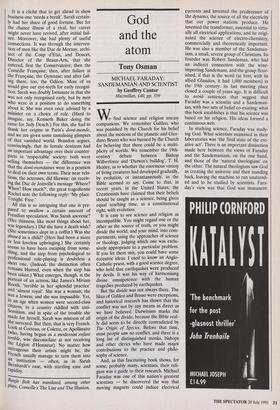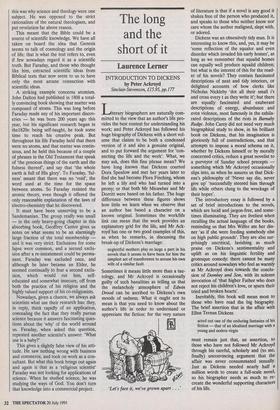God and the atom
Tony Osman
MICHAEL FARADAY: SANDEMANIAN AND SCIENTIST by Geoffrey Cantor Macmillan, f40, pp. 359 We find science and religion uneasy companions. We remember Galileo, who was punished by the Church for his belief about the motions of the planets: and Gior- dano Bruno who was burned by the Church for believing that there could be a multi- plicity of worlds. We remember the 19th- century debate between Bishop Wilberforce and Darwin's bulldog', T. H. Huxley, as to whether the enormous variety of living creatures had developed gradually, by evolution, or instantaneously, as the Bible seemed to say. Come to that, in recent years, in the United States, the Creationists have claimed that their beliefs should be taught as a science, being given equal teaching time, as a constitutional right, with evolution. It is easy to see science and religion as incompatible. You might regard one or the other as the source of truth, or you might divide the world, and your mind, into com- partments, using the approaches of science or theology, judging which one was exclu- sively appropriate to a particular problem. If you let them mix, you could have some eccentric ideas: I used to know an Anglo- Catholic priest, with a good science degree, who held that earthquakes were produced by devils. It was his way of harmonising divine omnipotence with the human tragedies produced by earthquakes. But the divide was not always there. The likes of Galileo and Bruno were exceptions, and historical research has shown that the conflict was not by any means as direct as we have believed. Darwinism marks the origin of the divide, because the Bible real- ly did seem to be directly contradicted by The Origin of Species. Before that time, most people saw no conflict, and there is a long list of distinguished monks, bishops and other clerics who have made major contributions to the practice and philo- sophy of science.
And, as this fascinating book shows, for some, probably many, scientists, their reli- gion was a guide to their research. Michael Faraday was one of this nation's greatest scientists — he discovered the way that moving magnets could induce electrical currents and invented the predecessor of the dynamo, the source of all the electricity that our power stations produce. He invented the transformer, essential to virtu- ally all electrical applications, and he origi- nated the science of electro-chemistry, commercially and theoretically important. He was also a member of the Sandeman- ians, a small, severe group of Christians. Its founder was Robert Sandeman, who had an indirect connection with the wine- importing Sandemans, and the group flour- ished, if that is the word (at best, with its allied Glassites, it had 1,000 members) in the 19th century: its last meeting place closed a couple of years ago. It is difficult to avoid sentences that suggest that Faraday was a scientist and a Sandeman- ian, with two sets of belief co-existing; what this book establishes is that his science was based on his religion. His ideas formed a continuous web.
In studying science, Faraday was study- ing God. What scientists examined in their laboratories was 'the final state of the cre- ative act'. There is an important distinction made here between the views of Faraday and the Sandemanians, on the one hand, and those of the 'natural theologians' on the other. The natural theologians saw God as creating the universe and then standing back, leaving the machine to run unattend- ed and to be studied by scientists. Fara- day's view was that God was immanent: this was why science and theology were one subject. He was opposed to the strict rationalism of the natural theologians, and put revelation far above reason.
This meant that the Bible could be a source of scientific knowledge. We have all taken on board the idea that Genesis seems to talk of cosmology and the origin of life: that is what the text refers to, even if few nowadays regard it as a scientific truth. But Faraday, and those who thought like him, extracted scientific ideas from Biblical texts that now seem to us to have only the most arcane connection with scientific ideas.
A striking example concerns atomism. John Dalton had published in 1808 a total- ly convincing book showing that matter was composed of atoms. This was long before Faraday made any of his important discov- eries — he was born 200 years ago this year, but his significant research began in the1820s: being self-taught, he took some time to reach his creative peak. But throughout his life Faraday held that there were no atoms, and that matter was contin- uous, and he held this because of a couple of phrases in the Old Testament that speak of 'the precious things of the earth and the fulness thereof', and say that 'the whole earth is full of His glory'. To Faraday, 'ful- ness' meant that there was no `void', the word used at the time for the space between atoms. So Faraday resisted the atomic theory, even though it offered the only reasonable explanation of the laws of electro-chemistry that he discovered.
It must have been unnerving to be a Sandemanian. The group really was small — in the only heavy-going chapter in this absorbing book, Geoffrey Cantor gives us notes on what seems to be an alarmingly large fraction of the total membership and it was very strict. Exclusions for some lapse were common, and a second exclu- sion after a re-instatement could be perma- nent. Faraday was excluded once, and although he later became an Elder, he seemed continually to fear a second exclu- sion, which would cut him, self- educated and somewhat insecure, off from both the practice of his religion and the highly valued support of his co-religionists.
Nowadays, given a chance, we always ask scientists what use their research has: they, in reply, think rapidly of an application, concealing the fact that they really pursue science because it answers fascinating ques- tions about the 'why' of the world around us. Faraday, when asked this question, repeated another scientist's answer: 'What use is a baby?'
This gives a slightly false view of his atti- tude. He saw nothing wrong with business and commerce, and took on work as a con- sultant. But what this book brings out again and again is that as a 'religious scientist' Faraday was not looking for applications of science. When he studied science, he was studying the ways of God. You don't turn that knowledge into a commercial project.



















































 Previous page
Previous page